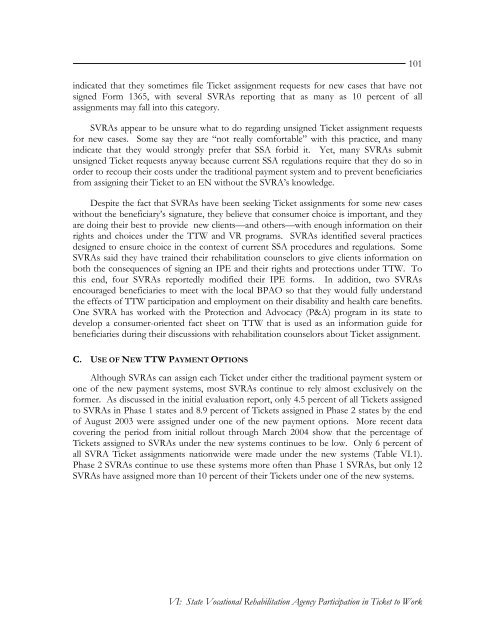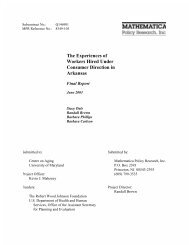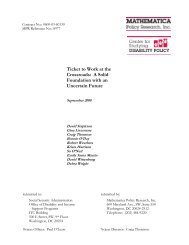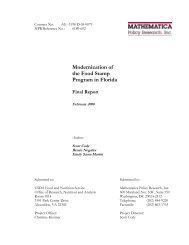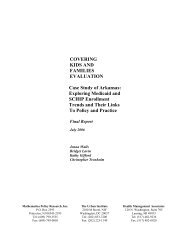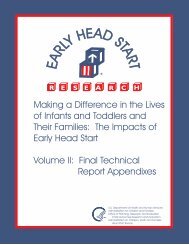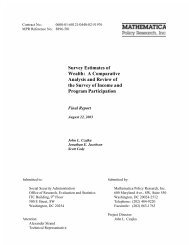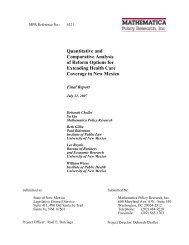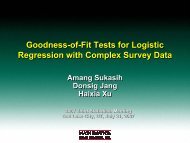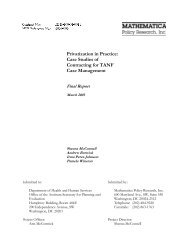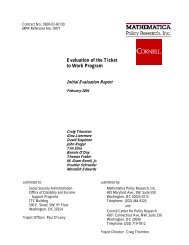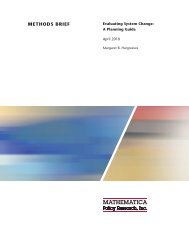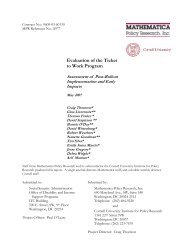Evaluation of the Ticket to Work Program, Implementation ...
Evaluation of the Ticket to Work Program, Implementation ...
Evaluation of the Ticket to Work Program, Implementation ...
You also want an ePaper? Increase the reach of your titles
YUMPU automatically turns print PDFs into web optimized ePapers that Google loves.
indicated that <strong>the</strong>y sometimes file <strong>Ticket</strong> assignment requests for new cases that have notsigned Form 1365, with several SVRAs reporting that as many as 10 percent <strong>of</strong> allassignments may fall in<strong>to</strong> this category.SVRAs appear <strong>to</strong> be unsure what <strong>to</strong> do regarding unsigned <strong>Ticket</strong> assignment requestsfor new cases. Some say <strong>the</strong>y are “not really comfortable” with this practice, and manyindicate that <strong>the</strong>y would strongly prefer that SSA forbid it. Yet, many SVRAs submitunsigned <strong>Ticket</strong> requests anyway because current SSA regulations require that <strong>the</strong>y do so inorder <strong>to</strong> recoup <strong>the</strong>ir costs under <strong>the</strong> traditional payment system and <strong>to</strong> prevent beneficiariesfrom assigning <strong>the</strong>ir <strong>Ticket</strong> <strong>to</strong> an EN without <strong>the</strong> SVRA’s knowledge.Despite <strong>the</strong> fact that SVRAs have been seeking <strong>Ticket</strong> assignments for some new caseswithout <strong>the</strong> beneficiary’s signature, <strong>the</strong>y believe that consumer choice is important, and <strong>the</strong>yare doing <strong>the</strong>ir best <strong>to</strong> provide new clients—and o<strong>the</strong>rs—with enough information on <strong>the</strong>irrights and choices under <strong>the</strong> TTW and VR programs. SVRAs identified several practicesdesigned <strong>to</strong> ensure choice in <strong>the</strong> context <strong>of</strong> current SSA procedures and regulations. SomeSVRAs said <strong>the</strong>y have trained <strong>the</strong>ir rehabilitation counselors <strong>to</strong> give clients information onboth <strong>the</strong> consequences <strong>of</strong> signing an IPE and <strong>the</strong>ir rights and protections under TTW. Tothis end, four SVRAs reportedly modified <strong>the</strong>ir IPE forms. In addition, two SVRAsencouraged beneficiaries <strong>to</strong> meet with <strong>the</strong> local BPAO so that <strong>the</strong>y would fully understand<strong>the</strong> effects <strong>of</strong> TTW participation and employment on <strong>the</strong>ir disability and health care benefits.One SVRA has worked with <strong>the</strong> Protection and Advocacy (P&A) program in its state <strong>to</strong>develop a consumer-oriented fact sheet on TTW that is used as an information guide forbeneficiaries during <strong>the</strong>ir discussions with rehabilitation counselors about <strong>Ticket</strong> assignment.101C. USE OF NEW TTW PAYMENT OPTIONSAlthough SVRAs can assign each <strong>Ticket</strong> under ei<strong>the</strong>r <strong>the</strong> traditional payment system orone <strong>of</strong> <strong>the</strong> new payment systems, most SVRAs continue <strong>to</strong> rely almost exclusively on <strong>the</strong>former. As discussed in <strong>the</strong> initial evaluation report, only 4.5 percent <strong>of</strong> all <strong>Ticket</strong>s assigned<strong>to</strong> SVRAs in Phase 1 states and 8.9 percent <strong>of</strong> <strong>Ticket</strong>s assigned in Phase 2 states by <strong>the</strong> end<strong>of</strong> August 2003 were assigned under one <strong>of</strong> <strong>the</strong> new payment options. More recent datacovering <strong>the</strong> period from initial rollout through March 2004 show that <strong>the</strong> percentage <strong>of</strong><strong>Ticket</strong>s assigned <strong>to</strong> SVRAs under <strong>the</strong> new systems continues <strong>to</strong> be low. Only 6 percent <strong>of</strong>all SVRA <strong>Ticket</strong> assignments nationwide were made under <strong>the</strong> new systems (Table VI.1).Phase 2 SVRAs continue <strong>to</strong> use <strong>the</strong>se systems more <strong>of</strong>ten than Phase 1 SVRAs, but only 12SVRAs have assigned more than 10 percent <strong>of</strong> <strong>the</strong>ir <strong>Ticket</strong>s under one <strong>of</strong> <strong>the</strong> new systems.VI: State Vocational Rehabilitation Agency Participation in <strong>Ticket</strong> <strong>to</strong> <strong>Work</strong>


